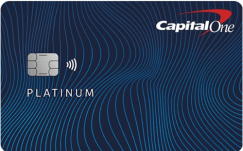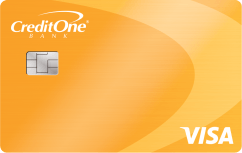At Experian, one of our priorities is consumer credit and finance education. This post may contain links and references to one or more of our partners, but we provide an objective view to help you make the best decisions. For more information, see our Editorial Policy.
Some of the best credit cards for people with bad or poor credit are unsecured and secured cards with low annual fees. Often, these cards can serve as stepping stones, giving you access to credit now and—with responsible use—helping you improve your credit scores. You may be able to upgrade or move on to better cards later. Getting a credit card with bad credit and managing it properly by making on time payments may be a good approach to building credit.
3 Partner Offers
The OpenSky® Secured Visa® Credit Card
The OpenSky® Secured Visa® Credit Card is a secured card with a minimum $200 refundable security deposit (which becomes your credit line) and $35 annual fee. The card doesn't offer any rewards and it won't be a good fit for everyone. There's no credit check required, however, which means it could be a good option if you're having trouble getting approved for other cards. And it reports payments to all three credit bureaus (Experian, TransUnion and Equifax), helping you build credit on all three credit reports.
The OpenSky® Secured Visa® Credit Card is also one of the few secured cards available to people who don't have or want a bank account. Instead of making an electronic transfer, you can choose to send the deposit with a Western Union wire transfer, or mail a check or money order.

The OpenSky® Secured Visa® Credit Card
on Capital Bank N.A.'s website
Recommended FICO® Score*
The OpenSky® Secured Visa® Credit Card
APR
25.14% Variable
Intro APR
Rewards
None
Annual Fee
$35
Card Details
- New feature! Earn up to 10% cash back on everyday purchases.
- No credit check to apply. Zero credit risk to apply!
- Looking to build or rebuild your credit? 2 out of 3 OpenSky cardholders increase their credit score by an average of 41 points in just 3 months.
- Get free monthly access to your FICO score in our mobile application
- Build your credit history across 3 major credit reporting agencies: Experian, Equifax, and TransUnion
- Add to your mobile wallet and make purchases using Apple Pay, Samsung Pay and Google Pay
- Fund your card with a low $200 refundable security deposit to get a $200 credit line
- Apply in less than 5 minutes with our mobile first application
- Fund your security deposit over 60 days with the option to make partial payments
- Over 1.4 Million Cardholders Have Used OpenSky Secured Credit Card To Improve Their Credit
Capital One Platinum Secured Credit Card
As a secured card, the Capital One Platinum Secured Credit Card stands out because you may qualify to put down a refundable security deposit starting at $49 to get a $200 initial credit line (you can also deposit more than the minimum to get a higher credit line). There's also no annual fee or foreign transaction fee, which could make this an inexpensive option for building credit.
Capital One will also automatically consider raising your credit limit after you've made your first six payments on time. And, you may qualify to have your security deposit refunded as a statement credit if you use your card responsibly.

Capital One Platinum Secured Credit Card
on Capital One's website
Recommended FICO® Score*
Capital One Platinum Secured Credit Card
APR
29.99% (Variable)
Intro APR
Rewards
None
Annual Fee
$0
Card Details
- No annual or hidden fees. See if you're approved in seconds
- Building your credit? Using the Capital One Platinum Secured card responsibly could help
- Put down a refundable security deposit starting at $49 to get a $200 initial credit line
- You could earn back your security deposit as a statement credit when you use your card responsibly, like making payments on time
- Be automatically considered for a higher credit line in as little as 6 months with no additional deposit needed
- Enjoy peace of mind with $0 Fraud Liability so that you won't be responsible for unauthorized charges
- Monitor your credit score with CreditWise from Capital One. It's free for everyone
- Get access to your account 24 hours a day, 7 days a week with online banking to access your account from your desktop or smartphone, with Capital One's mobile app
Credit One Bank® Secured Card
The Credit One Bank® Secured Card is a good no-annual-fee secured card that also offers a rewards program. You'll earn 1% cash back rewards on eligible gas and grocery purchases as well as mobile phone, internet, cable and satellite TV services. Terms apply.
The standard $200 security deposit applies when you open this card.

Credit One Bank® Secured Card
on Credit One Bank's website
Terms Apply
Recommended FICO® Score*
Credit One Bank® Secured Card
APR
29.24% Variable
Intro APR
Rewards
Earn 1% cash back rewards on eligible gas, grocery purchases and mobile phone, internet, cable and satellite TV services. Terms apply.
Annual Fee
$0
Card Details
- Earn 1% cash back rewards on eligible gas, grocery purchases and mobile phone service, internet, cable and satellite TV services, terms apply
- With $0 Fraud Liability, you won’t be responsible for unauthorized charges
- Looking to rebuild credit? We report to the major credit bureaus monthly
- Earn interest on your required security deposit account (minimum deposit $200)
- Never miss an account update with customizable text and email alerts
- Manage your account on-the-go with the Credit One Bank mobile app
- Show off your personality by selecting from a variety of card designs, a fee may apply
How to Decide Which Card Is Right for You
Picking the right card depends on which cards you'll likely be able to get and why you want to get a credit card.
If you primarily want a credit card to improve your credit, the exact card doesn't matter as much as how you use it. Credit scores don't distinguish between secured and unsecured credit cards, and cards' rewards programs, fees and interest rates don't impact credit scores.
Make sure that the card issuer reports your account to all three major credit bureaus—most major issuers do—and then only make a small purchase each month before paying the bill in full. Also, make at least your minimum payment on time to avoid late payments, which can lead to fees and hurt your credit.
Credit building aside, if you want a card for everyday use and will likely be able to pay the bill in full, a card with a rewards program could be a good fit. But if you want a card for emergency expenses that will likely take some time to pay down, a low interest rate or promotional offer may be more important than rewards.
What Is the Difference Between a Secured and Unsecured Card?
In terms of how you use the card, secured and unsecured cards are identical in many ways. The main difference is that you need to provide the card issuer a security deposit to get a secured card; unsecured cards don't require a security deposit.
There's generally a minimum deposit requirement for secured cards, such as $200, and your card's credit limit will often be based on your security deposit. You may be able to provide a larger deposit if you want a higher limit. Just keep in mind that you might not get the security deposit back until you close the account or the card issuer upgrades you to an unsecured card (not all cards have this option).
Secured cards are sometimes a good option for people who have bad credit. Whichever type of card you choose, make sure it reports payments to the credit bureaus to help you build credit. And with either type of card, avoid using a large portion of your card's credit limit if possible and always pay your bill on time. Paying your bill in full each month will also help you avoid paying interest.
How to Improve Your Credit Before Applying for a Credit Card
There are different steps you can take to improve your credit before applying for a new credit card. Depending on why you have bad or poor credit in the first place, it could take some time to move into a new credit score range (such as fair or good). However, here are some actions that can help:
- Pay down current credit card debt.
- Get a new credit card, only use a small portion of its credit limit and make at least the minimum payment on time.
- Open a credit-builder loan and make on-time monthly payments.
- Rehabilitate defaulted federal student loans.
- Use Experian Boost®ø to add on-time phone, utility and streaming service payments to your Experian credit report.
You may also want to review your credit reports for erroneous negative marks. Disputing errors could get the negative marks corrected or deleted, which could help your credit scores.
What to Do if You're Denied for a Credit Card
If your credit card application is denied, the card issuer will send you an adverse action letter explaining why. You have the right to get a free copy of your credit report to get a better understanding of why you were denied.
You may also want to call the issuer and ask why your application was denied. In some cases, the decision can be reversed. But often, you may need to improve your creditworthiness before trying again later—or try to get a different credit card if you want one now.
A few card issuers might let you apply with a cosigner, which could help your chances. Or, if you initially tried for an unsecured card, you could apply for a secured card instead. You can also try to get prequalified for a credit card, which will tell you if you're likely to get approved or denied without impacting your credit scores.
Get Matched With Credit Cards
Finding your next credit card could be difficult, particularly when a low credit score limits your options. We've highlighted some of the top picks above for people with bad or poor credit. You can also use Experian CreditMatch™ credit card marketplace to get matched with our partners' cards and offers, filter options based on your preferences and create a side-by-side comparison of your top picks.

